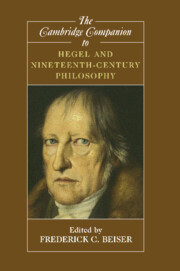Book contents
- Frontmatter
- Introduction: The Puzzling Hegel Renaissance
- 1 Hegel: A Life
- 2 Ancient Skepticism, Modern Naturalism, and Nihilism in Hegel’s Early Jena Writings
- 3 Hegel’s Phenomenology as a Systematic Fragment
- 4 The Independence and Dependence of Self-Consciousness: The Dialectic of Lord and Bondsman in Hegel's Phenomenology of Spirit
- 5 Hegel’s Logic
- 6 Hegel’s Idealism
- 7 Hegel and Hermeneutics
- 8 Hegel’s Social Philosophy
- 9 Hegel’s Philosophy of Religion
- 10 Hegel and Mysticism
- 11 Philosophizing about Nature: Hegel’s Philosophical Project
- 12 Hegel’s Criticism of Newton
- 13 The Logic of Life: Hegel’s Philosophical Defense of Teleological Explanation of Living Beings
- 14 Hegel and Aesthetics: The Practice and “Pastness” of Art
- 15 The Absence of Aesthetics in Hegel’s Aesthetics
- Bibliography
- Index
5 - Hegel’s Logic
Published online by Cambridge University Press: 28 July 2009
- Frontmatter
- Introduction: The Puzzling Hegel Renaissance
- 1 Hegel: A Life
- 2 Ancient Skepticism, Modern Naturalism, and Nihilism in Hegel’s Early Jena Writings
- 3 Hegel’s Phenomenology as a Systematic Fragment
- 4 The Independence and Dependence of Self-Consciousness: The Dialectic of Lord and Bondsman in Hegel's Phenomenology of Spirit
- 5 Hegel’s Logic
- 6 Hegel’s Idealism
- 7 Hegel and Hermeneutics
- 8 Hegel’s Social Philosophy
- 9 Hegel’s Philosophy of Religion
- 10 Hegel and Mysticism
- 11 Philosophizing about Nature: Hegel’s Philosophical Project
- 12 Hegel’s Criticism of Newton
- 13 The Logic of Life: Hegel’s Philosophical Defense of Teleological Explanation of Living Beings
- 14 Hegel and Aesthetics: The Practice and “Pastness” of Art
- 15 The Absence of Aesthetics in Hegel’s Aesthetics
- Bibliography
- Index
Summary
Hegel's Science of Logic does not enjoy the best of reputations. It is invariably criticized for being obscure and impenetrable, or it is simply ignored altogether, as if it had never been written in the first place. Allen Wood speaks for many who have read some of Hegel's dense and difficult text when he maintains that the philosophical paradoxes explored in it are frequently based on “shallow sophistries” and that the resolution to such paradoxes supplied by Hegel's system is often “artificial and unilluminating”. With even friends of Hegel, such as Wood, dismissing the Logic in this way, it is hardly surprising that (as Wood notes) “Hegel's system of dialectical logic has never won acceptance outside an isolated and dwindling tradition of incorrigible enthusiasts”.
In the eyes of such enthusiasts, however - who include, for example, Hans-Georg Gadamer, Dieter Henrich, Jean Hyppolite, and John Burbidge - Hegel's Logic is by no means shallow or sophistical, but is one of the most subtle and profound works of philosophy ever produced. My aim in this chapter is to shed light on the distinctive purpose and method of Hegelian logic in the hope of enabling many more readers than hitherto to discover that subtlety and profundity for themselves.
- Type
- Chapter
- Information
- Publisher: Cambridge University PressPrint publication year: 2008
- 5
- Cited by

